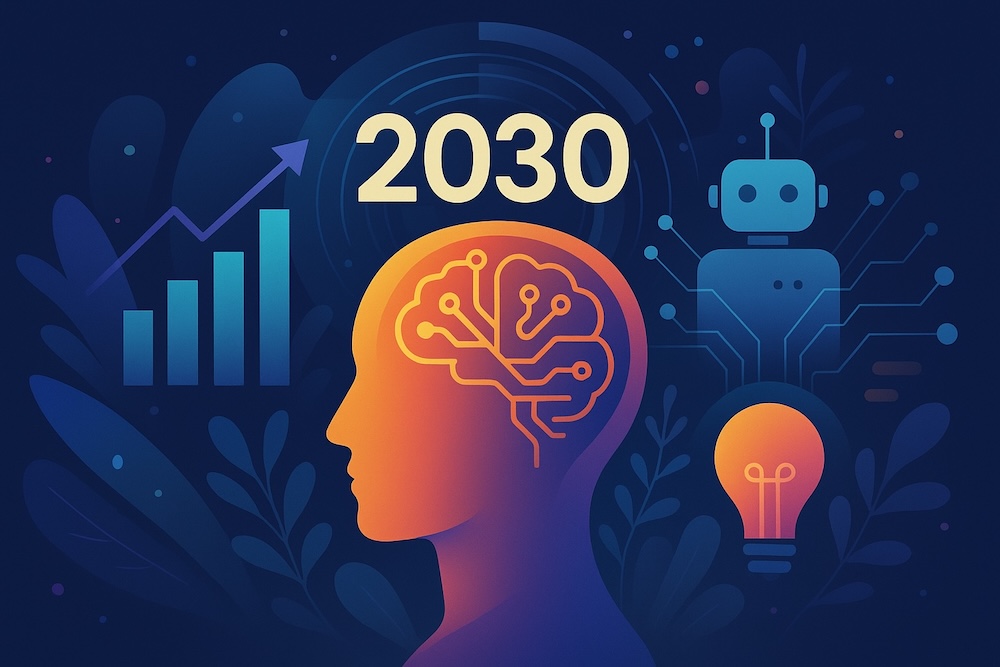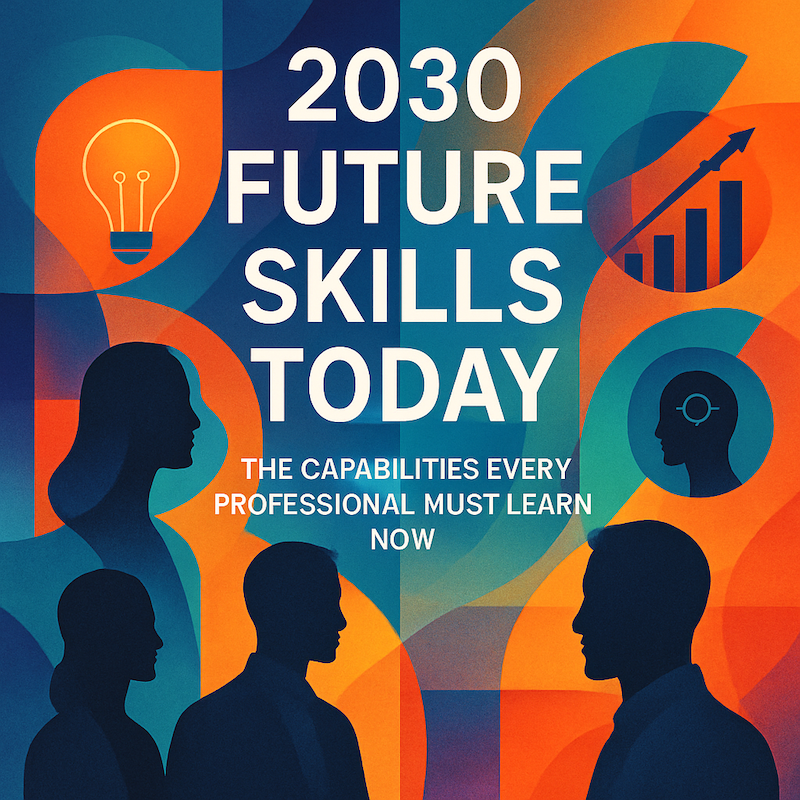The world of work isn’t changing slowly — it’s shifting at a scale and speed we’ve never seen.
The major global reports agree:
- AI fluency
- Creative thinking
- Analytical reasoning
- Leadership & influence
- Agility & adaptability
…are the defining skills of the next decade.
Below is a combined model, pulling from:
- World Economic Forum’s Future of Jobs Report
- McKinsey Global Institute Skill Shift Research
- PwC’s Workforce of the Future
- IBM & Deloitte skills reports
- My work with organizations and studying innovative skill development
This is a skill map that is helpful to use with executives, consultants, analysts, and innovation teams. This short i2 Skills Assessment Video makes the case for why our current world of work demands change and new skills for the world ahead.
THE FUTURE SKILLS TODAY MODEL
Five core skill domains, each tied to a capability you can train and develop.
1. Cognitive & Analytical Skills
The WEF ranks this at the top — again.
Includes:
- Analytical thinking
- Complex problem-solving
- Data literacy
- AI-assisted reasoning
- Systems thinking
Why it matters:
Every role is becoming a decision-making role.
With AI, the question becomes:
➡️ Can you ask better questions than others?
➡️ Can you think clearly in ambiguity?
AI amplifies good thinking — and exposes shallow thinking.
2. Creative Thinking & Innovation Skills
Surprisingly (or not), creative thinking is now a top global skill (again).
Includes:
- Idea generation
- Creative problem-solving
- Experimentation
- Design thinking
- Scenario thinking
- Innovation mindset
This is no longer “nice to have.”
It’s core to competitive advantage.
Organizations want employees who can imagine, not just execute. (This is my favorite skill area.)
3. Technological & AI Fluency
McKinsey calls this the fastest-growing skill domain globally.
Includes:
- AI literacy
- Automation tools
- Data analysis software
- Workflow tools
- Digital collaboration
- Tool fluency (not coding—using)
AI literacy is the new computer literacy.
It’s becoming the baseline for all professionals — analysts, consultants, managers, facilitators, leaders.
4. Leadership, Influence & Social Skills
PwC’s own research puts this at the heart of the “human advantage.”
Includes:
- Communication
- Storytelling
- Emotional intelligence
- Empathy
- Team leadership
- Influence without authority
In a world of AI, human skills become more valuable, not less.
The leaders who thrive will be those who can:
➡️ Inspire
➡️ Facilitate
➡️ Influence
➡️ Communicate clearly
The ability to lead across cultures, across distance, and across functions is essential.
5. Agility, Resilience & Adaptive Learning
This is the competency behind all other competencies.
Includes:
- Flexibility
- Growth mindset
- Continuous learning
- Problem re-framing
- Handling uncertainty
The World Economic Forum calls this “the multiplier skill.”
It makes every other skill upgradeable.
If you can adapt quickly, you can always remain relevant.
THE SKILL COMBINATION THAT MATTERS MOST
If you only focus on one thing this year, it might be this:
Analytical Thinking + Creative Thinking + AI Fluency
This triad is now the core capability of high performers.
It’s how you:
- Make better decisions
- Generate better ideas
- See more possibilities
- Work faster with better outcomes
- Stay relevant as jobs change
- Produce thinking clients and leaders actually want
This is the combination I’ve been developing in my own work — and teaching through my innovation, facilitation, and design thinking programs.
How to Start Building These Skills (This Week)
You don’t need a massive program to begin.
Here are practical entry points:
1. Analytical Thinking
Prompt: “Help me analyze this like a strategy consultant.”
Do this once a day.
2. Creative Thinking
Prompt: “Generate 10 unusual ideas for X from other industries.”
Do this twice a week.
3. AI Fluency
Spend 10 minutes experimenting with a new tool (ChatGPT, Canva AI, Miro AI, Suno, etc.).
4. Leadership & Communication
Record a 60-second video summarizing a project update.
Watch it, improve clarity and structure.
5. Agility & Learning
Take one skill you want to develop and create a two-week learning sprint.
Small experiments → Big transformation.
The Opportunity
The future will not be owned by:
- The most technical
- The most experienced
- The most senior
It will be owned by those who can:
- Think deeply
- Create boldly
- Lead confidently
- Use AI intelligently
- Adapt consistently
This isn’t just future-of-work theory.
This is what I see daily across the organizations I work with — from global consulting teams to facilitators to leaders designing change.
And the good news?
Every one of these skills is trainable.
Dive Deeper
- World Economic Forum’s Future of Jobs Reporthttps://www.weforum.org/publications/the-future-of-jobs-report-2025/
- McKinsey Global Institute — Skill Shift Research“Skill Shift: Automation and the Future of the Workforce”
https://www.mckinsey.com/capabilities/people-and-organizational-performance/our-insights/skill-shift-automation-and-the-future-of-the-workforce
- PwC — Workforce of the Future“Workforce of the Future: The Competing Forces Shaping 2030”
https://www.pwc.com/gx/en/services/people-organisation/workforce-of-the-future/workforce-of-the-future-the-competing-forces-shaping-2030-pwc.pdf
- IBM & Deloitte — Skills ReportsIBM: “The Enterprise Guide to Closing the Skills Gap”
https://www.ibm.com/downloads/cas/LL5XGZPY
Deloitte: “Future of Work: Ways of Working in 2035”
https://www2.deloitte.com/global/en/pages/human-capital/articles/the-future-of-work.html
- Our work with leaders, innovators, and facilitators across industries and reporting on Future Skills for the past 10 years.https://www.innovationtraining.org/innovation-skills-for-the-future/
Keep experiencing, reflecting, and learning.
Reach out if you’d like a program for your group or organization to help people find and develop future skills in an innovative way using design thinking.

